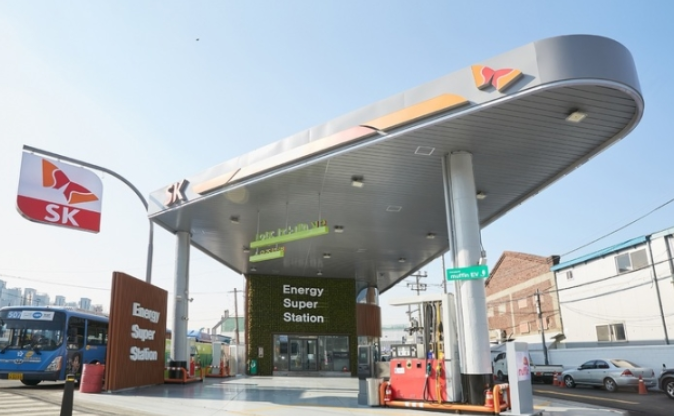SK Energy, a major South Korean oil refiner, teamed up with Korea Hydro & Nuclear Power Co. (KHNP) to install electric vehicle (EV) and hydrogen charging facilities across the country.
The company said on Friday it has signed a memorandum of understanding (MOU) with the state-run power supplier KHNP to disseminate urban Energy Superstations and to build hydrogen charging stations.
Energy Superstation refers to SK's new business model that adds distributed energy sources such as photovoltaic (PV) and fuel cell systems to existing gas and LPG stations to generate electricity for EV charging.
It is gaining attention, as its distributed energy system will lessen the loss of power transmission and distribution, increase the energy self-sufficiency ratio of the cities and establish stable EV charging networks.
The two parties plan to build energy superstations in idle state-owned land as well as SK-owned gas stations, LPG charging stations, and truck service stations.
Since last year, SK Energy has installed an energy superstation in SK Bakmi Gas Station to independently produces eco-friendly electricity through its PV facility (20.6 kW) and fuel cell stacks (300 kW) by way of the regulatory sandbox.
At the moment, SK is selling the generated energy to Korea Electric Power Corporation (KEPCO), but once the relevant laws are amended, it aims to use the generated electricity to power two super-fast (350 kW) and fast (100 kW) EV charging stations.
SK and KHNP will also work together to build on-site hydrogen charging stations based on "Trigen" fuel cells to produce electricity, hydrogen, and heat on-site at the same time.
An on-site charging station uses hydrogen produced on-site directly for charging.
SK plans to test-install them in its truck service stations where demand for charging hydrogen commercial vehicles is high, and gradually expand them to highway rest areas and bus garages across the country.
Write to Seo-Woo Jang at
suwu@hankyung.com



